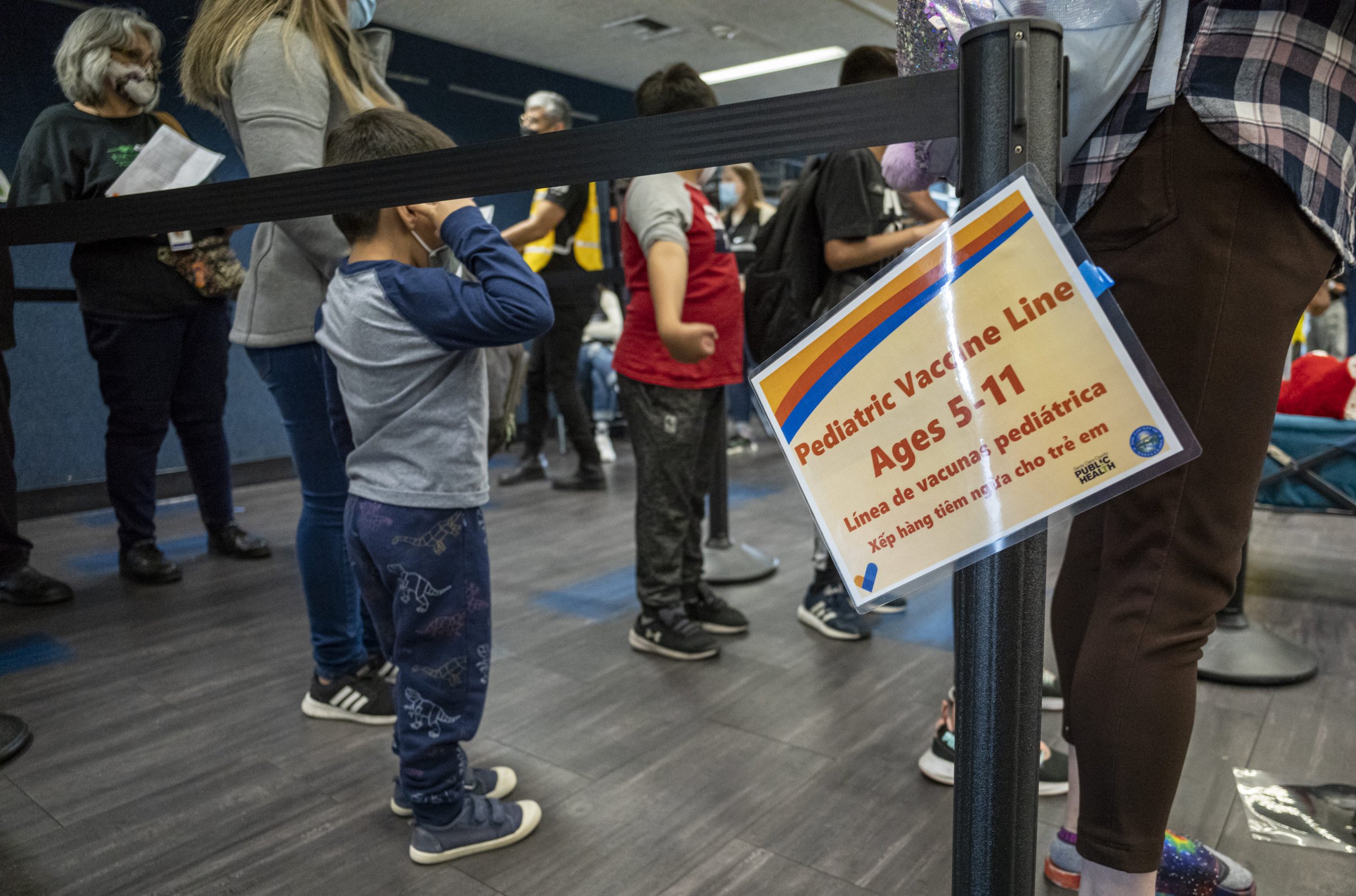
California is delaying implementation of a requirement that K-12 students be vaccinated against COVID-19 in order to attend school, state health officials announced this week as the country grapples with a lagging COVID-19 vaccination rate among children.
Under the new timeline, California’s vaccine requirement will not take effect until at least July 1, 2023, and after full approval of the vaccine for children by the U.S. Food and Drug Administration (FDA), “to ensure sufficient time for successful implementation of new vaccine requirements,” the California Department of Public Health said in a statement on Thursday.
The FDA fully approved the Pfizer-BioNTech vaccine for people 16 years and older in August, and the Moderna vaccine in January for those 18 and older, but has not extended full approval to younger ages. Children age 5 and older are eligible to be vaccinated against COVID-19 under the FDA’s emergency use authorization; studies have shown the vaccine is safe and effective for that age group.
In October, California became the first state to announce that, once the vaccine receives full FDA approval, children would be required to get it to attend school. “The state already requires that students are vaccinated against viruses that cause measles, mumps, and rubella—there’s no reason why we wouldn’t do the same for COVID-19,” California Gov. Gavin Newsom said at the time.
Read more: Schools Could Help More Kids Get the COVID-19 Vaccine. But History Has Some Warnings
Louisiana and Washington, D.C., also announced similar mandates and will require the COVID-19 vaccine for in-person school attendance in the 2022-23 school year, for those in an age group with full FDA approval. New York and Illinois currently require COVID-19 vaccines for students at public colleges and universities, but not at the K-12 level.
Meanwhile, 18 states have banned COVID-19 vaccine mandates for students, according to a tracker by the National Academy for State Health Policy.
California’s official statement on the reasons for the delay downplays any political aspect, focusing entirely on the logistics of the rule. Nevertheless, the debate over vaccine mandates in schools is the latest example of intense polarization over pandemic safety restrictions. While 70% of Democrats favor requiring students to be fully vaccinated against COVID-19, just 17% of Republicans do, according to a new poll by the University of Chicago Harris School of Public Policy and the Associated Press-NORC Center for Public Affairs Research. Parents of children attending K-12 schools were also less likely than others to support vaccine or mask mandates in school, the poll found.
At the same time, the vaccination rate among American children has stalled: So far, just 28% of 5-to-11-year-olds and 58% of 12-to-17-year-olds are fully vaccinated against COVID-19, according to an American Academy of Pediatrics analysis of CDC data. And some public-health experts say school vaccine requirements could be key to changing that.
Denis Nash, an epidemiologist at the CUNY Graduate School of Public Health and Health Policy, says school vaccine mandates have historically been an effective way to boost child vaccination rates.
“There’s a long precedent for requiring vaccination for school entry,” Nash says. “And it’s very effective at getting vaccine coverage up to the requisite levels in children for things like measles, mumps, and rubella.”
Read more: Setting the Record Straight about COVID-19 Vaccines for Children
Health officials in Washington State also decided this week not to impose a COVID-19 vaccine mandate in schools, after the Washington State Board of Health debated the challenges of implementing such a requirement and confronting vaccine hesitancy in the community while maintaining in-person learning, the Spokesman-Review reported.
Even a school vaccine mandate might not be enough to persuade the most vaccine-hesitant parents. Nearly a quarter of parents said they would “definitely not” get their 12-to-17-year-old vaccinated against COVID-19, and 4% said they would only get their teen vaccinated if they were required to do so for school, according to a Kaiser Family Foundation survey published in February. Many who oppose COVID-19 vaccinations for children point to the fact that their age group has been less likely to get seriously ill or to die from COVID-19—though that does happen.
“We have to remember that it’s a public health problem, and it’s a public health crisis, and kids don’t exist in a vacuum,” Nash says. “They live in households with adults who are vulnerable for all kinds of different reasons. And they do contribute to spread, in addition to their own risk.”
More Must-Reads from TIME
- Cybersecurity Experts Are Sounding the Alarm on DOGE
- Meet the 2025 Women of the Year
- The Harsh Truth About Disability Inclusion
- Why Do More Young Adults Have Cancer?
- Colman Domingo Leads With Radical Love
- How to Get Better at Doing Things Alone
- Michelle Zauner Stares Down the Darkness
Write to Katie Reilly at Katie.Reilly@time.com